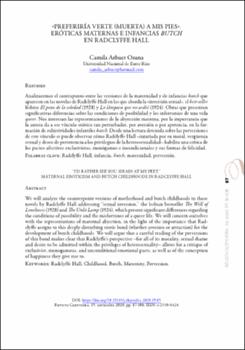«Preferiría verte (muerta) a mis pies». Eróticas maternas e infancias butch en Radclyffe Hall
Autor
Arbuet Osuna, CamilaFecha
2020Resumen
Analizaremos el contrapunto entre las versiones de la maternidad y de infancias butch que
aparecen en las novelas de Radclyffe Hall en las que aborda la «inversión sexual», el best-seller
lésbico El pozo de la soledad (1928) y La lámpara que no ardió (1924). Obras que presentan
significativas diferencias sobre las condiciones de posibilidad y los infortunios de una vida
queer. Nos interesan las representaciones de la abyección materna, por la importancia que
la autora da a ese vínculo erótico tan perturbador, por aversión o por apetencia, en la formación de subjetividades infantiles butch. Desde una lectura detenida sobre las perversiones
de este vínculo se puede observar cómo Radclyffe Hall –injuriada por su moral, vergüenza
sexual y deseo de pertenencia a los privilegios de la heterosexualidad– habilita una crítica de
los pactos afectivos exclusivistas, monógamos e incondicionales y sus formas de felicidad. We will analyze the counterpoint versions of motherhood and butch childhoods in those
novels by Radclyffe Hall addressing “sexual inversion,” the lesbian bestseller The Well of
Loneliness (1928) and The Unlit Lamp (1924), which present significant differences regarding
the conditions of possibility and the misfortunes of a queer life. We will concern ourselves
with the representations of maternal abjection, in the light of the importance that Radclyffe assigns to this deeply disturbing erotic bond (whether aversion or attraction) for the
development of butch childhoods. We will argue that a careful reading of the perversions
of this bond makes clear that Radclyffe’s perspective –for all of its morality, sexual shame
and desire to be admitted within the privileges of heterosexuality– allows for a critique of
exclusivist, monogamous, and unconditional emotional pacts, as well as of the conception
of happiness they give rise to.





